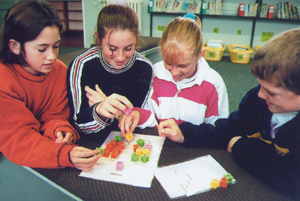![]() STUDENT PERFORMANCE ON ESSENTIAL SKILLS
STUDENT PERFORMANCE ON ESSENTIAL SKILLS
![]()
Gordon Knight
The
New Zealand Curriculum Framework specifies eight essential skills
that are developed across the curriculum. This study selected
tasks from NEMP reports and examined student performance on them
in relation to six of the skills—communication, numeracy,
information, problem-solving, social and co-operative, and physical.
(Management and competitive skills and work and study skills are
not directly assessed in the NEMP tasks.) |
| The NEMP reports provide two opportunities to examine the development of the essential skills: (i) performance of Year 4 and Year 8 students on common tasks within each cycle; and (ii) performance of these students on trend tasks that are common across the two assessment cycles. Neither of these comparisons was available in the reports concerning the achievement of Mori students, but all other reports from 1995 to 2000 were considered. Although some tasks involved more than one essential skill, 299 assessment items were identified that substantially assessed a single essential skill. The performance of students on these items formed the basis of this analysis. |  |
| •
The NEMP assessments were shown to provide an extensive coverage of
the performance of students on six of the eight essential skills in
the New Zealand Curriculum Framework. Each of the skills is tested
in a wide variety of contexts. • Performance on tasks involving communication skills, problem-solving skills, and physical skills was relatively weak at both Years 4 and 8. • The gain in student performance in problem-solving between Years 4 and 8 was lower in tasks involving creative thinking than in tasks involving reflective or logical thinking. |
•
Performance on tasks involving information skills and social and co-operative
skills was relatively strong at both Years 4 and 8. • The growth in performance from Years 4 to 8 was greater on tasks involving numeracy skills than for any of the other skills, possibly because a number of these skills are specifically taught over this period. • There was no evidence of substantial changes in performance between cycles of assessment on trend tasks involving the essential skills. |
![]()
|
Perhaps the most significant feature of these results for teaching
and learning is the identification of the relative weakness of performance
at both Years 4 and 8 on those items relating to the two generic skills
of communication and problem-solving. This finding is consistent with
comments in many of the NEMP reports that thinking and explaining
are particular areas of difficulty for students. The emphasis placed
on knowledge in today’s society as indicated by references to
|
the ‘knowledge economy’ and to ‘knowledge wave conferences’ is one that perhaps should be questioned. A successful economy, or a successful life, does not depend principally on what people know, but on what people can do with what they know. Problem-solving and communication are essential skills in this context. Accordingly, those of us who are teachers need constantly to challenge our students to think and explain. |